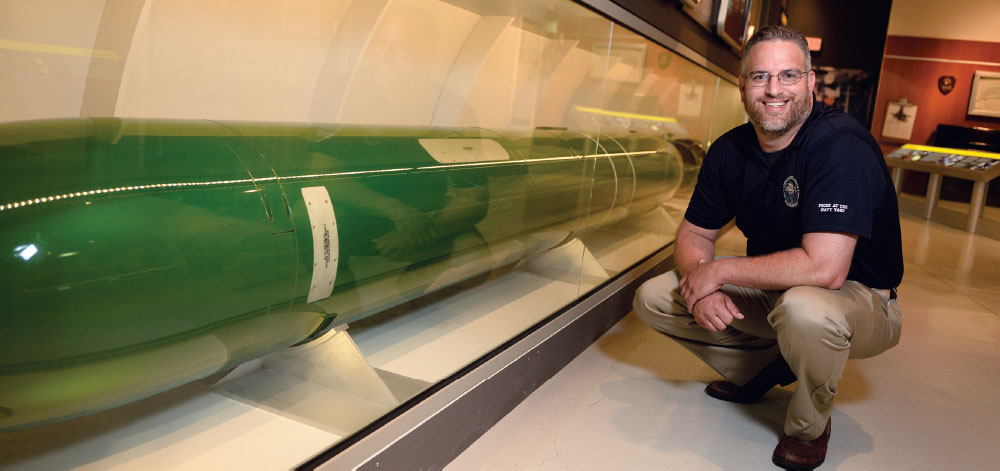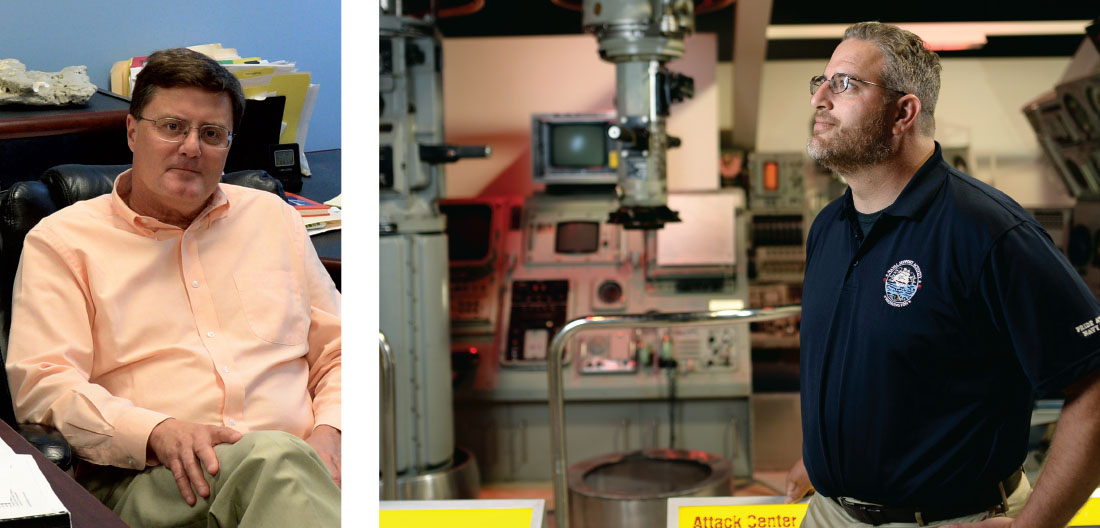Own It
Brent Whelan ’98 and Paul Gayes
At Coastal Carolina University’s spring commencement in 1998, a graduating marine science major decided to play a joke on his favorite professor.
Paul Gayes of the CCU science faculty had been chosen to be the faculty announcer at the ceremony that year. Following the usual procedure, each student in the line handed their name card to Gayes, and he read it out as they crossed the platform. This particular student took a pen, scratched out his name, and wrote down “Mr. Whale.” He handed the card to Gayes, who gave him an “are you kidding?” grin and without missing a beat spoke out clearly: “Brent Gibson Whelan!”
“I couldn’t believe it,” says Whelan, still amazed 19 years later. “He had taken the time to learn our middle names!”
Whelan, now a submarine combat control logistics manager for the U.S. Navy near Washington, D.C., says that when he first arrived on campus as a freshman in 1993, he wasn’t sure what Gayes and his other professors thought of him. He didn’t look like a promising student, he recalls, with his sandals and his disheveled appearance.

Naval Affairs: Brent Whelan ’98 is a submarine combat control logistics manager for the U.S Navy. He is shown here at the museum of the Washington Navy Yard, which is located near his office.
“Dr. Gayes looked at me like, ‘Oh, not another one.’” But Whelan found his niche in Coastal’s marine science program. He had grown up in Elkton, Md., at the northern edge of the Chesapeake Bay. He spent his summers along the ocean and loved everything connected with it. He enrolled at Coastal, attracted by the Academic Common Market, which allows students in certain majors from selected states to pay in-state tuition.
Gayes taught Whelan’s marine science 101 class, and the student was immediately impressed by the professor’s command of the material.
“He had so much knowledge, and it was not from the book,” says Whelan. “In fact, he didn’t even use a book. It was obvious he had been there and done it all firsthand.”
In his second year, Whelan was one of about 20 students who joined Gayes on research trips aboard the Ferrel, the 153-foot ship of the National Oceanic and Atmospheric Agency (NOAA), to study offshore sediment deposits for use in beach renourishment.
“Students were often on the Ferrel for days at time,” says Gayes, who has headed CCU’s Burroughs & Chapin Center for Marine and Wetland Studies since 1989. Gayes estimates that, over the years, more than 500 CCU students sailed and studied on NOAA research ships. “They were not treated as students, but as staff, which fosters a sense of responsibility. It’s not like being in a class. They have a chance to contribute and make mistakes and learn from them. Brent thrived in that environment. He was very animated and outgoing and fun to be around.”
“To be 18 or 19 years old and doing research on a huge ship on the ocean, it was great,” says Whelan. He took as many of Gayes’ classes as he could. “It got to the point that I would look for his name on the registration form before I looked for the title of the class.”
In upper-level courses, which were often small classes of eight or 10 students, Whelan recalls that “Paul would just say, out of the blue, ‘Grab your gear,’ and we’d go down to the marsh to take core samples, waist-deep in mud.”
The thing about Gayes and his staff that amazed Whelan the most—and would have the greatest impact on his own career—was their resourcefulness.
“Dr. Gayes and his staff at the Center for Marine and Wetlands Studies, particularly Neal Gielstra, never let lack of resources get in the way of creating what they needed to get the job done,” says Whelan. “They could take what was in front of them and build anything. Paul and Neal together were like MacGyver! Whether it was a generator or a special vibracore drill rig, whatever.”

Key to Success: CCU professor Paul Gayes’ (left) resourceful approach to problem solving taught Brent Whelan ’98 a valuable lesson.
After graduating, Whelan started full time with the Navy doing metrical analysis. Channeling Gayes’ ingenuity, Whelan did his job so well that he earned a series of promotions at a rapid rate.
“The reason I was able to rise so fast is because in CCU’s marine science program I had been taught to figure things out on my own. You look, you listen, you figure out what you have to, and you do it. Own it. I made my first job obsolete in six weeks. They immediately placed me in a higher position. Same thing happened. Because what Paul taught me is that you don’t accept the status quo. You make your own status quo.”
In his present job, Whelan is in charge of all integrated logistics in Navy sub-marines that relate to combat functions. This includes training and maintenance materials, procurement of parts and stowage plans. With subs deployed all over the globe, the job often demands a high level of dexterity.
Gayes and Whelan keep up with each other mostly by email these days. When he gave a presentation in Washington recently, Gayes had a chance to have dinner and catch up with Whelan, whose job doesn’t allow him to get back to campus that often.
“I went to the first football game in 2003,” says Whelan. “It was eight years before I made another visit, and I literally got lost, the campus had grown so much!”
When they had dinner in Washington, Whelan went into great depth about his job with his mentor, who couldn’t be prouder of his former student.
“Brent is proud of his alma mater and keeps up with what’s going on,” says Gayes. “It really is gratifying to see students like Brent who had the heart, enthusiasm and motivation to find what they needed to fulfill their potential. Teal Nation is all about belonging to a culture that is bigger than yourself, taking ownership and pride in it, protecting it, supporting it. Seeing these kids succeed is the best part of my job.”


